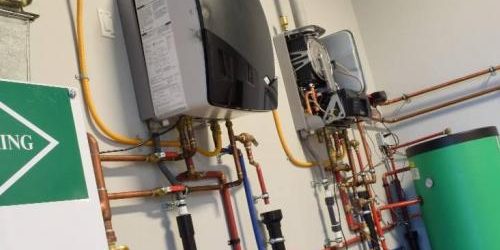Boilers are heating systems that use water or steam to provide warmth to residential buildings. They are commonly used as an alternative to forced-air furnaces in areas with cold climates. Residential boilers typically consist of a central heating unit, pipes or radiators to distribute heat, and a control system to regulate the temperature.
Here’s an overview of how a residential boiler system generally operates:
Conventional boilers
Heat Generation
The boiler’s primary function is to generate heat by burning fuel, such as natural gas, oil, or propane. The fuel is ignited in a combustion chamber, and the resulting hot gases pass through a heat exchanger.
Heat Transfer
In a water-based system, the hot gases heat the water inside the heat exchanger, raising its temperature. In a steam-based system, the heat from the combustion gases is used to boil water, creating steam.
Distribution
The heated water or steam is circulated through pipes or radiators located in different rooms or zones of the house. These pipes or radiators release heat into the surrounding space, warming the rooms.
Control System
A thermostat or temperature control unit monitors the temperature in the house. When the temperature falls below the desired level, the thermostat signals the boiler to activate and produce heat. Once the temperature reaches the set point, the boiler shuts off.
Residential boilers offer several advantages:
Energy Efficiency: Boilers are known for their energy efficiency because they can achieve high levels of heat transfer. Water-based systems can also incorporate features like zoned heating, allowing different areas of the house to be heated independently and conserving energy.
Comfort: Boilers provide radiant heat, which is often considered more comfortable than forced-air systems. Radiant heat warms objects and surfaces directly, creating a more even and comfortable indoor environment.
Durability: Boilers are known for their durability and long lifespan, especially compared to furnaces. They have fewer moving parts, reducing the likelihood of mechanical failures.
Versatility: Residential boilers can be used for multiple purposes, such as providing domestic hot water for bathing and washing, in addition to space heating.
Residential boilers require professional installation and periodic maintenance to ensure optimal performance and safety. The size and capacity of the boiler should be chosen based on the heating needs and size of the home.
Overall, residential boilers are a popular heating option for homeowners seeking efficient, comfortable, and long-lasting heating systems.
Combi boilers
A combi boiler, short for combination boiler, is a type of boiler that serves both as a central heating unit and a water heater. It is a compact and efficient system that provides hot water on demand without the need for a separate storage tank.
Here are some key features and functions of a combi boiler:
Heating and Hot Water
A combi boiler is designed to provide both space heating and hot water for domestic use. It can heat water for taps, showers, baths, and other household needs, as well as provide warmth to the radiators or underfloor heating system.
On-Demand Hot Water
Combi boilers heat water directly from the mains supply whenever hot water is required. There is no need for a separate storage tank, as the water is heated instantaneously as it flows through the boiler. This eliminates the need to wait for the water to heat up and allows for an unlimited supply of hot water.
Energy Efficiency
Combi boilers are known for their energy efficiency. They do not have the standby heat losses associated with traditional storage tanks since they heat water on demand. This can lead to energy savings and lower utility bills.
Compact Design
Combi boilers are compact in size and can be wall-mounted, making them suitable for homes with limited space. Their compact design also simplifies installation.
High Flow Rates
Combi boilers have the capability to deliver high flow rates of hot water, ensuring an adequate supply for multiple outlets simultaneously. However, the flow rate may decrease if multiple hot water outlets are used simultaneously.
Control System
Combi boilers are equipped with controls and thermostats to regulate temperature and allow users to adjust settings according to their needs. Some models may offer advanced features such as programmable timers and wireless controls for enhanced convenience.
It’s important to note that the size and capacity of a combi boiler should be chosen based on the hot water demand and the heating requirements of the household. Professional installation and regular maintenance are essential for optimal performance and safety.
Combi boilers are a popular choice for residential properties, particularly in smaller homes or apartments, due to their space-saving design, energy efficiency, and the convenience of on-demand hot water supply.
